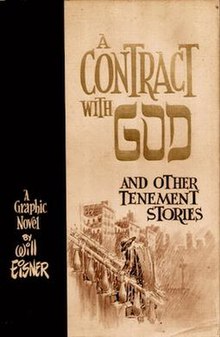A Contract With God

A Contract with God and Other Tenement Stories is a graphic novel by American cartoonist Will Eisner
published in 1978. The book's short story cycle revolves around poor Jewish characters who live in a
tenement in New York City. Eisner produced two sequels set in the same tenement: A Life Force in
1988, and Dropsie Avenue in 1995. Though the term graphic novel did not originate with Eisner, the
book is credited with popularizing its use.
Four stand-alone stories make up the book: in A Contract with God a religious man gives up his
faith after the death of his young adopted daughter; in The Street Singer a has-been diva tries to
seduce a poor, young street singer, who tries to take advantage of her in turn; a bullying racist is
led to suicide after false accusations of pedophilia in The Super; and Cookalein intertwines the
stories of several characters vacationing in the Catskill Mountains. The stories are thematically
linked with motifs of frustration, disillusionment, violence, and issues of ethnic identity. Eisner
uses large, monochromatic images in dramatic perspective, and emphasizes the caricatured characters'
facial expressions; few panels or captions have traditional borders around them.
Eisner began his comic book career in 1936 and had long held artistic ambitions for what was
perceived as a lowbrow medium. He found no support for his ideas, and left the world of commercial
comics after ending his signature work The Spirit in 1952. The growth of comics fandom convinced him
to return in the 1970s, and he worked to realize his aspirations of creating comics with literary
content. He wanted a mainstream publisher for the book and to have it sold in traditional
bookstores, rather than in comic book shops; the small press Baronet Books released A Contract with
God in 1978 and marketed it as a graphic novel, which thereafter became the common term for
book-length comics. It sold slowly at first, but gained respect from Eisner's peers, and since has
been reprinted by larger publishers. A Contract with God cemented Eisner's reputation as an elder
statesman of comics, and he continued to produce graphic novels and theoretical works on comics
until his death in 2005.
